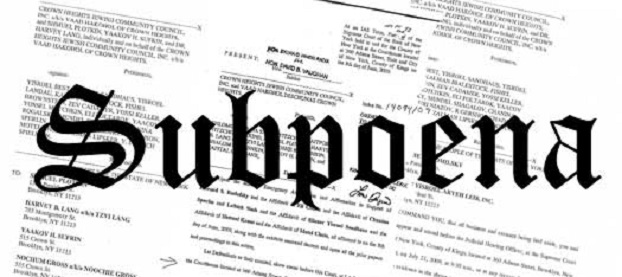Blog
Subpoenas: What to Know if You've Been Served
Most of the cases I have been involved with over the last 30 years involve a “subpoena." The very idea of being subpoenaed makes many people weak in the knees. However, knowing what a subpoena is, what it can and cannot do, and what rights you have in response can minimize the stress and inconvenience.
A subpoena is a request for the production of documents or to appear in a courtroom or other legal forum. It is a command that you testify and/or provide tangible information that may help to support the facts at issue in the pending case in which you may or may not be a party. There are two types of subpoenas: a “subpoena ad testificandum,” which requires you testify before a court or other legal authority, and a “subpoena duces tecum,” requiring that you appear, possibly testify, and produce documents, materials, or other tangible evidence. Under state and federal law, subpoenas are most frequently utilized by attorneys to obtain information from the opposing party or other witnesses that may have material information. Subpoenas may request such diverse things as computer files and downloaded materials, medical and insurance records, income tax returns, photographs, and employee records. In criminal matters, subpoenas may seek blood test results or even DNA samples.
Under Connecticut law, a subpoena must be served on the person from whom testimony or evidence is requested via hand delivery or in-person service. Unlike a summons in a civil matter, it cannot be affixed to your front door or mailed. It must be served more than 18 hours prior to requested testimony and, with regard to the production of documents, must also comply with Connecticut court rules of practice regarding written discovery. Under those rules, a subpoena cannot seek the production of documents or other tangible things sooner than would be required if a written discovery request was sent to a party.
The single most important thing to do if served with a subpoena is to not ignore it. A subpoena is part of the court process, and failure to respond is considered contempt of court. Such contempt is punishable by civil and even potentially criminal penalties. The most severe penalty that can be imposed is the court’s issuance of a “capias,” which is essentially an arrest warrant for a person who fails to appear in response to a subpoena for testimony. Further, ignorance of a subpoena seeking documents can result in those documents being admitted into evidence without the right to future objection or various adverse inferences being drawn from the failure to produce documents at all.
Obviously, reading the subpoena to determine what is being requested, where, and when is of equal significance. If documentation sought is within your possession and control, you should do your best to safeguard it to facilitate production. Consultation with a lawyer, whether you are a party to the action or not, is also of critical importance. A lawyer will advise you of your rights, which include filing a motion to “quash” the subpoena (prohibit its enforcement) or seek a protective order limiting the scope of testimony or the timing and content of documents or other tangible evidence produced. More often than not, your counsel can facilitate communication and cooperation with the party seeking the information, come to terms on a reasonable time and content of production and testimony, and minimize your inconvenience. This may be of particular significance when the information or testimony sought is privileged or a confidential business record.
A person who receives a subpoena should take the necessary steps to comply, but someone who is subpoenaed does have rights, and subpoenas do have their limits. You should consult with an attorney who knows how to review and respond to one.
